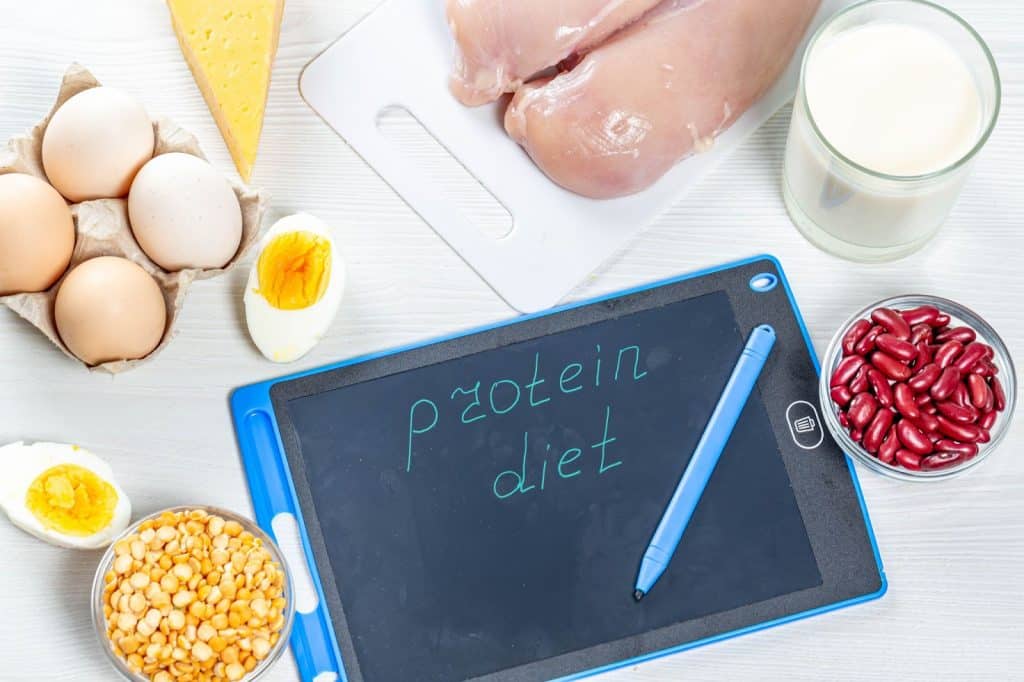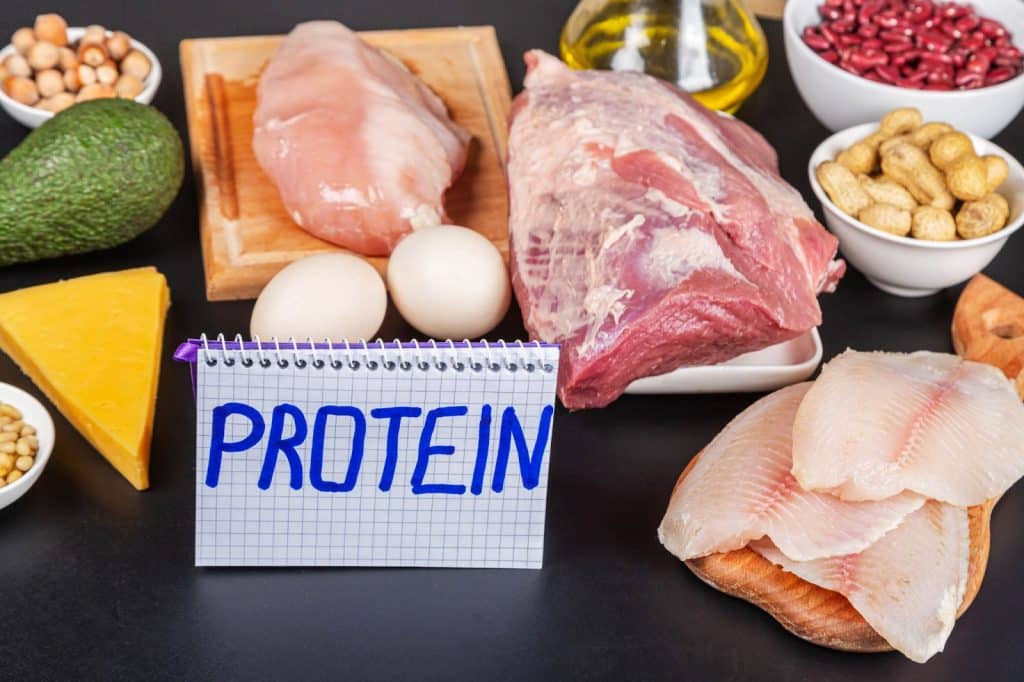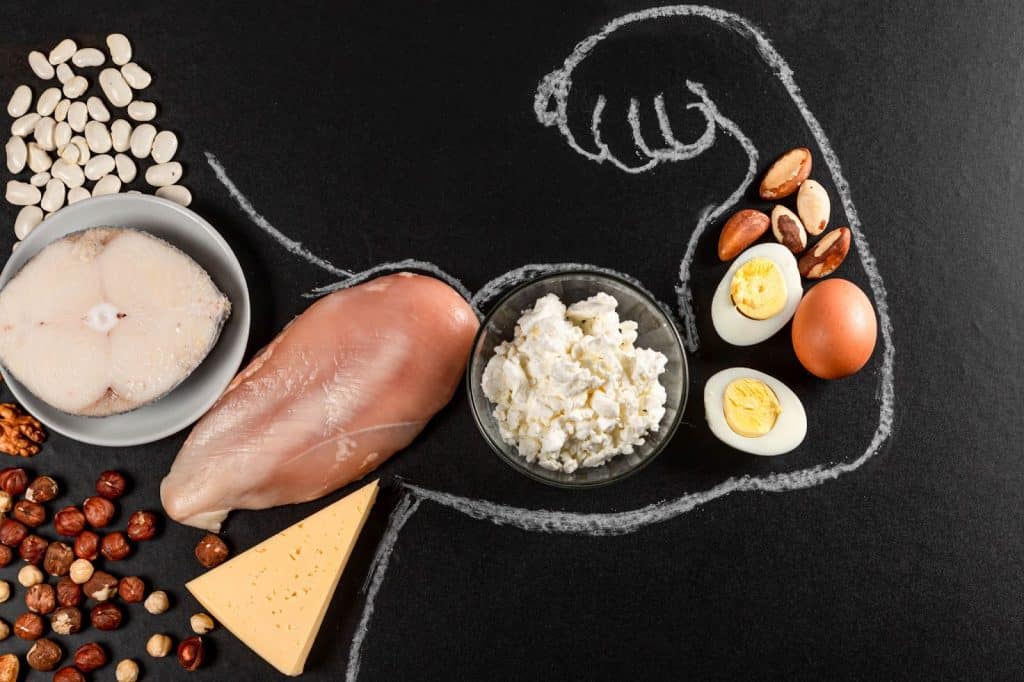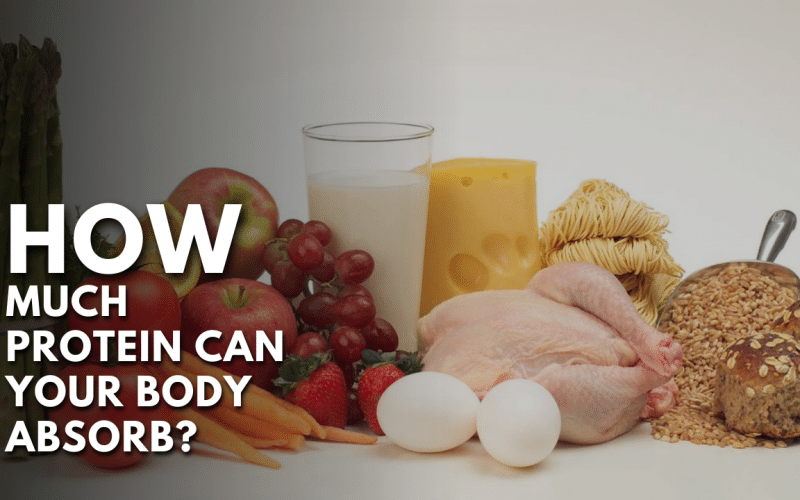Protein is an essential nutrient for the human body, providing the building blocks for muscles, bones, and other tissues.
While it is well known that a diet high in protein is important for good health, the question of how much protein the body can actually absorb remains a subject of debate.
In this article, we will explore the science behind protein absorption and how much protein can be effectively utilized by the body at once. This information is important for individuals looking to optimize their protein intake for health, fitness, or other goals.
How Much Protein Can My Body Absorb?
The amount of protein your body can absorb and use effectively depends on several factors, including weight, age, sex, physical activity level, and your overall health status.
For most healthy individuals, a general guideline is to aim for about 0.8 grams of protein per kilogram of body weight per day or approximately 10%-35% of your daily calorie intake. However, athletes, bodybuilders, and individuals with certain medical conditions may require higher protein intake.
It’s worth noting that consuming too much protein beyond what your body needs will not provide any additional benefits and may even lead to negative health effects.
Generally, it’s best to consume a balanced diet with adequate protein, carbohydrates, healthy fats, vitamins, and minerals for optimal health and performance.

Why Is the Timing of Protein Intake Important?
The timing of protein intake is important for several reasons, especially for those who are physically active and want to optimize their muscle growth and recovery.
Here are some reasons why timing matters:
- Muscle protein synthesis: Consuming protein after a workout can stimulate muscle protein synthesis, the process of building new muscle tissue. This is because physical activity, especially strength training, increases the body’s demand for amino acids, which are the building blocks of protein.
- Muscle recovery: Consuming protein after exercise can also aid in muscle recovery by reducing muscle damage and inflammation. This is because protein contains essential amino acids that are needed to repair and rebuild muscle tissue.
- Satiety: Consuming protein at meals and snacks throughout the day can help you feel fuller for longer, which may aid in weight management by reducing overall calorie intake.
- Maintenance of muscle mass: Consuming protein regularly throughout the day can help prevent the breakdown of muscle tissue, especially during times of caloric restriction or inactivity.
Factors Affecting Protein Absorption in Human Body
The factors affecting the amount of protein that a human body can absorb include:
- Age: As people age, their ability to absorb protein decreases.
- Digestive function: People with digestive problems, such as inflammatory bowel disease, may not absorb protein effectively.
- Type of protein: Different types of proteins have different rates of absorption, with some being absorbed more quickly than others.
- Food combinations: The presence of other macronutrients, such as fats and carbohydrates, can affect the rate of protein absorption.
- Vitamin and mineral status: Deficiencies in certain vitamins and minerals, such as iron and zinc, can impair protein absorption.
- Physical activity: Regular physical activity can increase the body’s ability to absorb protein.
- Overall health: Chronic diseases and infections can impair protein absorption and utilization.
Why Is Protein Important for Our Body?
Protein is important for our body because it plays a crucial role in numerous physiological processes.
It provides the building blocks for muscles, bones, skin, hair, and nails. It also helps produce hormones, enzymes, and other vital molecules in the body.
Additionally, protein is essential for repairing and maintaining tissues, supporting immune function, and regulating metabolism. Its sufficient intake is necessary for optimal growth and development, especially during periods of rapid change, such as adolescence and pregnancy.
Protein is also essential for weight management as it helps increase satiety, reduce cravings, and promote muscle maintenance during weight loss.
Overall, protein is an important macronutrient that should be included in a balanced and varied diet to support overall health and wellness.
What Are the Symptoms of Too Much Protein Intake?
While protein is essential for many bodily functions, consuming too much protein can lead to various symptoms and health concerns.
Here are some common symptoms of consuming too much protein:
- Dehydration: High-protein diets can cause dehydration because they require more water to metabolize the excess protein.
- Digestive issues: Consuming too much protein can lead to digestive issues such as bloating, constipation, diarrhea, and nausea.
- Kidney damage: Excessive protein intake can put a strain on the kidneys, leading to kidney damage and an increased risk of kidney stones.
- Bad breath: A high-protein diet can cause bad breath, as the breakdown of protein releases sulfur compounds that can create an unpleasant odor.
- Weight gain: Consuming too many calories from protein can lead to weight gain, as excess protein is converted into fat and stored in the body.
- Nutrient deficiencies: Consuming too much protein can lead to nutrient deficiencies, as a high-protein diet may not provide enough of other essential nutrients.
It’s important to note that the symptoms of consuming too much protein may vary depending on the individual’s overall health, activity level, and the sources of protein they consume.
It’s recommended to speak to a healthcare professional or a registered dietitian to determine the optimal amount of protein you should consume for your specific needs and goals.
Protein Saturation
The concept of protein saturation refers to the point at which the body has absorbed as much protein as it can use efficiently. Beyond this point, any additional protein consumed is not absorbed or used as effectively.
Simply put, protein saturation occurs when the body’s ability to absorb and utilize protein has been exceeded.

Factors that influence protein saturation include the time of day and physical activity. For example, protein absorption may be greater after physical activity when muscles are depleted and in need of repair. It may also be greater in the morning when the body has been in a fasted state overnight.
To optimize protein utilization, spreading protein intake throughout the day and consuming a variety of high-quality protein sources is recommended.
Can I Increase Protein Absorption in My Body?
Yes, you can increase protein absorption by:
- Eating protein with carbohydrates as insulin helps increase absorption
- Consuming enough calories to support protein synthesis
- Eating a variety of protein sources for a complete amino acid profile
- Taking protein evenly throughout the day
- Drinking adequate water
Note: Consult a healthcare professional before making significant changes to your diet.
Process of Protein Consumption
When we eat protein, it is broken down into smaller components called amino acids by the digestive system.
Firstly, the process of protein digestion starts in the stomach, where the enzyme pepsin breaks down the protein into smaller polypeptides. The stomach acid also helps to denature the proteins and make them more accessible to the digestive enzymes.
Next, the partially digested protein moves into the small intestine, where further enzymes from the pancreas and small intestine break down the polypeptides into individual amino acids.
These amino acids are absorbed into the bloodstream and transported to the liver.
In the liver, the amino acids are either used to build new proteins or broken down further to provide energy. Excess amino acids not needed by the body can be converted into glucose or fat for storage.
Overall, the process of protein digestion and absorption is important for providing the body with the necessary amino acids to support growth, repair, and various metabolic functions.
How Many Grams of Protein You Need To Build Muscle
If you’re looking to build muscle, consuming enough protein is essential. Protein is the building block of muscle tissue, and without enough of it, your muscles won’t be able to grow and recover properly after exercise.
The recommended daily protein intake for muscle building varies depending on several factors, such as age, gender, body weight, activity level, and fitness goals.
Generally, it’s recommended that adults aiming to build muscle consume between 1.2 to 2.2 grams of protein per kilogram of body weight per day.

For example, if you weigh 70 kilograms (154 pounds) and are aiming to build muscle, you should consume between 84 to 154 grams of protein per day.
It’s important to spread your protein intake throughout the day and include a variety of protein sources, such as lean meats, fish, eggs, dairy, legumes, nuts, and seeds, to ensure you’re getting all the essential amino acids your body needs to build muscle.
Keep in mind that consuming more protein than your body needs won’t necessarily lead to more muscle growth, as your body can only absorb and use a certain amount at a time. It’s also important to combine your protein intake with a well-rounded diet and regular strength training exercises to optimize muscle growth and recovery.
Frequently Asked Questions (FAQs)
Let’s take a look at a few frequently asked questions about protein absorption in the human body.
1. Is consuming too much protein harmful to the body?
Consuming too much protein can put stress on the kidneys and lead to kidney damage over time. It can also increase the risk of dehydration, osteoporosis, and liver damage. It can also displace essential nutrients in the diet, leading to deficiencies in other areas. It is important to maintain a balanced diet and not excessively consume any one macronutrient.
2. Does the body absorb more protein if consumed in larger amounts?
No, the human body does not absorb more protein if consumed in larger amounts. The body has a limited ability to absorb and utilize protein, and consuming more than needed will result in the excess being eliminated as waste.
3. What are some of the best food items for protein intake?
Some of the best food items for protein intake are meat (chicken, beef, pork, etc.), fish (salmon, tuna, etc.), dairy products (milk, cheese, yogurt), eggs, legumes (beans, lentils, peas), nuts and seeds (almonds, pumpkin seeds, etc.), soy products (tofu, tempeh, edamame), quinoa, and whey protein powder.
4. Where does excess protein go?
Excess protein in the body is not stored as such, like fat or carbohydrates. Instead, it is broken down into its component amino acids and then reassembled as needed for various metabolic processes or excreted as waste.
Any excess amino acids that the body does not use for energy or tissue building are converted to glucose or fatty acids and used for energy or stored as body fat.
5. Would consuming 50 grams of protein in one meal be too much?
It’s important to keep in mind that ingesting more than 30 grams of protein in a single meal is excessive because it will be quickly eliminated by the kidneys. Therefore, if you’re aiming to increase muscle mass, it’s best not to go overboard and consume 50 grams of protein at one time, as your body won’t be able to utilize all of it.
6. At what point does protein become fat in the body?
Any surplus calories will be stored in your body as fat, whether they come from protein, carbs, or fat. As a result, if you consume more calories than you burn, you will gain weight.
Wrapping Up
Protein is an essential nutrient that plays a crucial role in maintaining good health and supporting physical performance.
While the amount of protein your body can absorb and utilize effectively may vary depending on several factors, it’s generally recommended to consume a balanced diet that provides adequate protein and other vital nutrients.
Whether you’re an athlete striving to build muscle mass or just someone looking to maintain a healthy lifestyle, remember that protein is just one piece of the puzzle. So be sure to focus on consuming a variety of healthy foods, including plenty of fruits, vegetables, whole grains, and lean protein sources, to fuel your body and live your best life!






